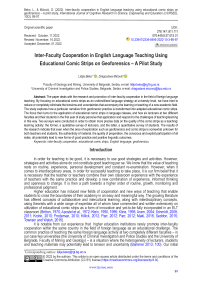Inter-faculty cooperation in English language teaching using educational comic strips on geoforensics - a pilot study
Автор: Lidija Beko, Dragoslava Mićović
Журнал: International Journal of Cognitive Research in Science, Engineering and Education @ijcrsee
Рубрика: Original research
Статья в выпуске: 3 vol.10, 2022 года.
Бесплатный доступ
The paper deals with the research and promotion of inter-faculty cooperation in the field of foreign language teaching. By focusing on educational comic strips as an underutilised language strategy at university level, we have tried to reduce or completely eliminate the tensions and uncertainties that accompany the learning or teaching of a new academic field. The study explores how a particular narrative from geoforensic practice is transformed into adapted educational comic strips. The focus then turns to the application of educational comic strips in language classes, and how six lecturers at two different faculties and their students in the first year of study perceive that application and respond to the challenges of teaching/learning in this way. Two surveys were conducted in order to obtain more precise data on the quality of the comic strips as a teaching/learning activity: the former, a qualitative survey of lecturers, and the latter, a quantitative survey of students. The results of the research indicate that even when the area of exploration such as geoforensics and comic strips is somewhat unknown for both teachers and students, the authenticity of material, the quality of preparation, the conscious and explicit participation of all sides, all potentially lead to new forms of good practice and positive linguistic outcomes.
Inter-faculty cooperation, educational comic strips, english language, geoforensics
Короткий адрес: https://sciup.org/170198691
IDR: 170198691 | УДК: 378.147::811.111 | DOI: 10.23947/2334-8496-2022-10-3-89-97
Список литературы Inter-faculty cooperation in English language teaching using educational comic strips on geoforensics - a pilot study
- Apostel, L., Berger, G., Briggs, A., Michaud, G., (1972). Interdisciplinarity problems of teaching and research in universities. Paris: Organization for Economic Cooperation and Development
- Aram, J. D. (2004). Concepts of interdisciplinarity: Configurations of knowledge and action. Human Relations, 57(4), 379-412. https://doi.org/10.1177/001872670404389
- Britton, J. (1970). Language and learning. London: Allen Lane.
- Bammer, G. (2013). Disciplining interdisciplinarity: Integration and implementation sciences for researching complex real-world problems. ANU Press. Retrieved from https://library.oapen.org/bitstream/handle/20.500.12657/33556/459901. pdf?sequence=1
- Donnelly, L. J. (2008). Communication in geology: A personal perspective and lessons from volcanic, mining, exploration, geotechnical, police and geoforensic investigations. Geological Society, London, Special Publications, 305(1), 107- 121. https://doi.org/10.1144/SP305.11
- Frodeman, R., (2010). Introduction. In R. Frodeman, J. T. Klein, & C. Mitcham (Eds.), The Oxford Handbook of Interdisciplinarity (pp. xxix-xxxix): The Oxford University Press.
- Killick, D. (2012). Seeing-Ourselves-in-the-World: Developing Global Citizenship Through International Mobility and Campus Community. Journal of Studies in International Education, 16(4), 372–389. https://doi.org/10.1177/1028315311431893
- Klein, J. T. (1990). Interdisciplinarity: History, theory, and practice. Wayne state university press.
- Klein, J. T. (1996). Crossing boundaries: Knowledge, disciplinarities, and interdisciplinarities. University of Virginia Press.
- Kline, S. J. (1995). Conceptual foundations for multidisciplinary thinking. Stanford University Press.
- Krohn W. (2010). Interdisciplinary cases and disciplinary knowledge. In: Frodeman, R., Klein, J. T., Mitcham, C., editors. The Oxford handbook of interdisciplinarity. Oxford: Oxford University Press. pp. 31–49.
- Mäki, U. (2016). Philosophy of interdisciplinarity. What? Why? How?. European Journal for Philosophy of Science, 6(3), 327- 342. https://doi.org/10.1007/s13194-016-0162-0
- Parr, G. (2012). Leading an international teaching practicum: Negotiating tensions in a site of border pedagogy. Asia-Pacific Journal of Teacher Education, 40(2), 97-109. https://doi.org/10.1080/1359866X.2012.669824
- Schmidt, J. C. (2008). Towards a philosophy of interdisciplinarity. Poiesis & Praxis, 5(1), 53-69. https://doi.org/10.1007/s10202- 007-0037-8
- Schmidt, J. C. (2011). What is a problem? On problem-oriented interdisciplinarity. Poiesis & Praxis, 7(4), 249-274. https://doi. org/10.1007/s10202-011-0091-0
- Seddon, T. (2016). Liquid Modernity and Educational Work: Boundary Politics in Global Transitions. London: Rutledge.
- Townsin, L., and C. Walsh. (2016). A new Border Pedagogy: Rethinking Outbound Mobility Programs in the Asian Century. In Handbook of Research on Study Abroad Programs and Outbound Mobility. Advances in Higher Education and Professional Development, edited by Velliaris, D. and D. Coleman-George, 215–247. Hershey, PA: IGI Global.


